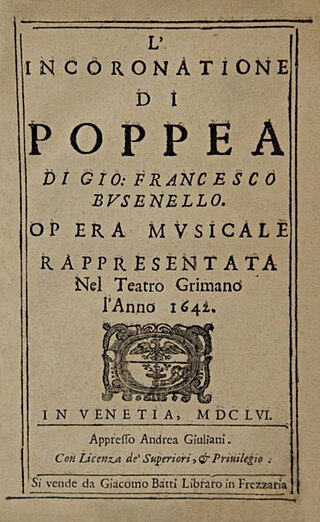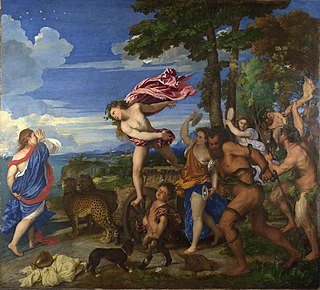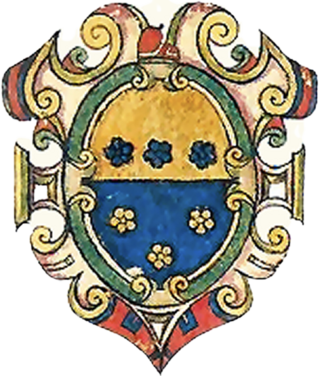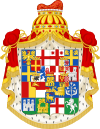
Claudio Giovanni Antonio Monteverdi was an Italian composer, choirmaster and string player. A composer of both secular and sacred music, and a pioneer in the development of opera, he is considered a crucial transitional figure between the Renaissance and Baroque periods of music history.

Barbara Strozzi was an Italian composer and singer of the Baroque Period. During her lifetime, Strozzi published eight volumes of her own music, and had more secular music in print than any other composer of the era. This was achieved without support from the Church or consistent patronage from the nobility.

Il ritorno d'Ulisse in patria is an opera consisting of a prologue and five acts, set by Claudio Monteverdi to a libretto by Giacomo Badoaro. The opera was first performed at the Teatro Santi Giovanni e Paolo in Venice during the 1639–1640 carnival season. The story, taken from the second half of Homer's Odyssey, tells how constancy and virtue are ultimately rewarded, treachery and deception overcome. After his long journey home from the Trojan Wars Ulisse, king of Ithaca, finally returns to his kingdom where he finds that a trio of villainous suitors are importuning his faithful queen, Penelope. With the assistance of the gods, his son Telemaco and a staunch friend Eumete, Ulisse vanquishes the suitors and recovers his kingdom.

L'incoronazione di Poppea is an Italian opera by Claudio Monteverdi. It was Monteverdi's last opera, with a libretto by Giovanni Francesco Busenello, and was first performed at the Teatro Santi Giovanni e Paolo in Venice during the 1643 carnival season. One of the first operas to use historical events and people, it describes how Poppaea, mistress of the Roman emperor Nero, is able to achieve her ambition and be crowned empress. The opera was revived in Naples in 1651, but was then neglected until the rediscovery of the score in 1888, after which it became the subject of scholarly attention in the late 19th and early 20th centuries. Since the 1960s, the opera has been performed and recorded many times.

Giulio Strozzi was a Venetian poet and libretto writer. His libretti were put to music by composers like Claudio Monteverdi, Francesco Cavalli, Francesco Manelli, and Francesco Sacrati. He sometimes used the pseudonym Luigi Zorzisto.

L'Arianna is the lost second opera by Italian composer Claudio Monteverdi. One of the earliest operas in general, it was composed in 1607–1608 and first performed on 28 May 1608, as part of the musical festivities for a royal wedding at the court of Duke Vincenzo Gonzaga in Mantua. All the music is lost apart from the extended recitative known as "Lamento d'Arianna". The libretto, which survives complete, was written in eight scenes by Ottavio Rinuccini, who used Ovid's Heroides and other classical sources to relate the story of Ariadne's abandonment by Theseus on the island of Naxos and her subsequent elevation as bride to the god Bacchus.
Count Nicolò Minato was an Italian poet, librettist and impresario. His career can be divided into two parts: the years he spent at Venice, from 1650 to 1669, and the years at Vienna, from 1669 until his death.

Giovanni Francesco Busenello was an Italian lawyer, librettist and poet of the 17th century.

Artemisia is an opera in three acts and a prologue by the Italian composer Francesco Cavalli from a libretto written by Nicolò Minato. It was first performed at the Teatro San Giovanni e San Paolo, Venice on 10 January 1657 and revived in Naples in 1658, Palermo in 1659, Milan in 1663 and Genoa in 1665.
Giacinto Andrea Cicognini (1606–1651) was an Italian playwright and librettist, the son of poet and playwright Jacopo Cicognini.
Giacomo Badoaro (1602–1654) was a Venetian nobleman and amateur poet. He is most famous for writing the libretto for Claudio Monteverdi's opera Il ritorno d'Ulisse in patria (1640). He also provided librettos for the operas Ulisse errante by Francesco Sacrati (1644) and Elena rapita da Teseo (1653) by Jacopo Melani. He was a member of the Venetian intellectual circle, the Accademia degli Incogniti.

The Teatro Santi Giovanni e Paolo was a theatre and opera house in Venice located on the Calle della Testa, and takes its name from the nearby Basilica of Santi Giovanni e Paolo, Venice. Built by the Grimani family in 1638, in its heyday it was considered the most beautiful and comfortable theatre in the city. The theatre played an important role in the development of opera and saw the premieres of several works by Francesco Cavalli, as well as Monteverdi's Il ritorno d'Ulisse in patria and L'incoronazione di Poppea.

The Italian composer Claudio Monteverdi (1567–1643), in addition to a large output of church music and madrigals, wrote prolifically for the stage. His theatrical works were written between 1604 and 1643 and included operas, of which three—L'Orfeo (1607), Il ritorno d'Ulisse in patria (1640) and L'incoronazione di Poppea (1643)—have survived with their music and librettos intact. In the case of the other seven operas, the music has disappeared almost entirely, although some of the librettos exist. The loss of these works, written during a critical period of early opera history, has been much regretted by commentators and musicologists.

Gerolamo Frigimelica Roberti was an Italian architect, librettist, and poet.

The Teatro Novissimo was a theatre in Venice located in the Campo Santi Giovanni e Paolo with its entrance on the Calle de Mendicanti. It was the first theatre built in Venice specifically for the performance of opera. Because it was purpose-built, it had a wider stage than its existing competitors which allowed for the elaborate productions which became the Novissimo's hallmark. The theatre opened in the Carnival season of 1641 with the premiere of Sacrati's opera La finta pazza. After its last production in 1645, the theatre was closed amidst mounting debts and was demolished in 1647.

Giovanni Francesco Loredan was a Venetian writer and politician, and a member of the noble family of Loredan. In 1630, he founded the Accademia degli Incogniti, a learned society of freethinking intellectuals, mainly noblemen, that significantly influenced the cultural and political life of mid-17th century Venice.

The House of Loredan-Santa Maria is a cadet branch of the noble House of Loredan which has produced many politicians, diplomats, military generals, naval captains, church dignitaries, writers and lawyers, and has played a significant role in the creation of modern opera with the Accademia degli Incogniti, also called the Loredanian Academy. The branch draws its name from the parishes of Santa Maria Formosa and Santa Maria dei Miracoli in Venice, around which it was historically settled. The progenitor of the branch is considered to be the famous admiral and procurator Pietro Loredan (1372-1438) by his sons Giacomo and Polo.
Scipione Errico was an Italian poet, writer, literary critic and academic.
Michelangelo Torcigliani was an Italian Baroque poet from Lucca.
















